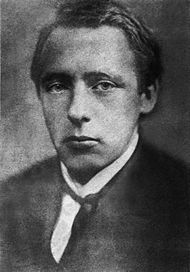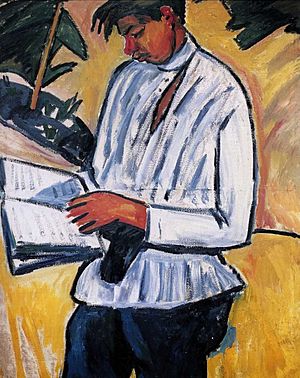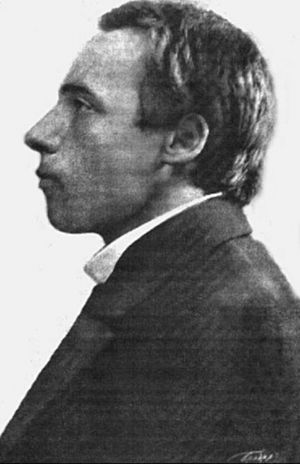Velimir Khlebnikov facts for kids
Quick facts for kids
Velimir Khlebnikov
|
|
|---|---|
 |
|
| Born | Viktor Vladimirovich Khlebnikov 9 November [O.S. 28 October] 1885 Malye Derbety, Astrakhan Governorate, Russian Empire |
| Died | 28 June 1922 (aged 36) Kresttsy, Novgorod Oblast, Russian SFSR, Soviet Union |
| Pen name | Velimir Khlebnikov |
| Literary movement | Russian Futurism |
Viktor Vladimirovich Khlebnikov, known by his pen name Velimir Khlebnikov (Russian: Велими́р Хле́бников; 9 November 1885 – 28 June 1922), was an important Russian poet and writer. He was a key figure in the Russian Futurist movement. This was a group of artists and writers who wanted to create new art forms. A famous language expert, Roman Jakobson, called Khlebnikov "the greatest world poet of our century." This shows how important his work was.
Contents
About Velimir Khlebnikov
Early Life and Education
Viktor Vladimirovich Khlebnikov was born in 1885 in Malye Derbety, which was part of the Russian Empire. Today, this area is in Kalmykia. His family had roots from Russia, Armenia, and Zaporozhian Cossacks. His younger sister, Vera Khlebnikova, became a talented artist.
Khlebnikov went to school in Kazan and later in Saint Petersburg. He eventually decided to leave school to focus completely on writing. His first works were written around 1908.
Joining the Futurists
Around 1909 and 1910, Khlebnikov met other artists who would become famous Russian Futurists. These included Vasily Kamensky, David Burliuk, and Vladimir Mayakovsky. Soon, Khlebnikov joined a group called Hylaea. This was the most important Russian Futurist group. Other members included Mayakovsky, Aleksei Kruchenykh, and David Burliuk.
Even before the Futurist movement fully started in Russia, Khlebnikov had already written many important poems. Other writers saw him as a very special and unique genius. Mayakovsky even called him a "poet for producers." In 1912, Khlebnikov helped publish a very important Futurist poetry book called A Slap in the Face of Public Taste.

His Unique Writing Style
Khlebnikov is known for many poems, such as "Incantation by Laughter" and "The Grasshopper" (both from 1908-1909). He also wrote "Snake Train" (1910) and the introduction to the Futurist opera Victory over the Sun (1913). He wrote plays like "Death's Mistake" (1915) and prose works like "Ka" (1915). One of his most famous works is "Zangezi", a play written in a special language called zaum.
Khlebnikov loved to experiment with the Russian language. He looked at the roots of words and made up many new ones, called neologisms. He also believed that the shapes and sounds of individual Cyrillic letters had special meanings. With another writer, Kruchenykh, he created zaum. This was a new language that was not meant to be easily translated.
Ideas for the Future
Khlebnikov also wrote essays about the future. He imagined how communication and travel might change. In "The Radio of the Future," he described a world where all human knowledge could be shared globally by radio. He also thought about new ways of living and moving around. He imagined people living and traveling in mobile glass rooms that could connect to tall buildings. In 1912, he even published a way to predict historical events. One of his predictions was about an "empire collapsing in 1917."
Later Life and Challenges
Khlebnikov supported the Russian Revolution of 1917. He shared many of its hopeful ideas for a better world. However, his writings were sometimes criticized by the Soviet government. They felt his work did not fit their rules for socialist realism, which was a style of art that showed life in a positive, heroic way.
In 1921, Khlebnikov traveled to Persia (modern-day Iran). He was very excited by his trip and wrote poems about the interesting places and people he met, including some dervishes. He had to return to Russia in August of that year.
In his last years, Khlebnikov became very interested in Slavic mythology. He also studied Pythagorean numerology, which is the study of numbers and their meanings. He created long "Tables of Destiny" to understand historical events using numbers.
Velimir Khlebnikov passed away in June 1922 at his friend Pyotr Miturich's house near Kresttsy. He had been suffering from gangrene and paralysis. It is thought he might have died from blood poisoning.
A small planet discovered in 1977 by a Soviet astronomer was named 3112 Velimir in his honor.
Published Works
Here are some of Velimir Khlebnikov's notable works:
- Long Poems
- 1910: "Snake Train"
- 1913: Prologue to the Futurist opera Victory over the Sun
- Plays
- 1912: The Little Devil
- Books
- 1912: Teacher and Student. Conversation
- 1914: Roar! Gauntlets, 1908–1914
- 1915: Death’s Mistake
- 1921: "Washerwoman & other poems"
- 1922: Zangezi (a "super-tale")
- Radio Project
- 1921: The Radio of the Future
- Short Stories
- 1913: “Nikolai”
Images for kids
-
Velimir Khlebnikov, painted in 1910 by Mikhail Larionov
See also
 In Spanish: Velimir Jlébnikov para niños
In Spanish: Velimir Jlébnikov para niños
 | Charles R. Drew |
 | Benjamin Banneker |
 | Jane C. Wright |
 | Roger Arliner Young |




